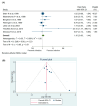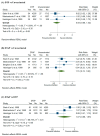Pertussis Vaccines Scarcely Provide Protection against Bordetella parapertussis Infection in Children-A Systematic Review and Meta-Analysis
- PMID: 38543887
- PMCID: PMC10974608
- DOI: 10.3390/vaccines12030253
Pertussis Vaccines Scarcely Provide Protection against Bordetella parapertussis Infection in Children-A Systematic Review and Meta-Analysis
Abstract
Background: Pertussis, or whooping cough, is a global public health concern. Pertussis vaccines have demonstrated good protection against Bordetella pertussis infections, but their effectiveness against Bordetella parapertussis remains debated due to conflicting study outcomes.
Methods: A systematic review and meta-analysis were conducted to assess the effectiveness of pertussis vaccines in protecting children against B. parapertussis infection. A comprehensive search of PubMed, Web of Science, and Scopus databases was conducted, and randomized controlled trials (RCTs) and observational studies that met inclusion criteria were included in the analysis.
Results: The meta-analysis, involving 46,533 participants, revealed no significant protective effect of pertussis vaccination against B. parapertussis infection (risk ratio: 1.10, 95% confidence interval: 0.83 to 1.44). Subgroup analyses by vaccine type and study design revealed no significant protection. The dearth of recent data and a limited pool of eligible studies, particularly RCTs, underscore a critical gap that warrants future research in the domain.
Conclusions: These findings offer crucial insights into the lack of effectiveness of pertussis vaccines against B. parapertussis. Given the rising incidence of cases and outbreaks, coupled with the lack of cross-protection by the existing vaccines, there is an urgent need to develop vaccines that include specific antigens to protect against B. parapertussis.
Keywords: acellular pertussis vaccine; effectiveness; parapertussis; pertussis; protection; whole cellular pertussis vaccine.
Conflict of interest statement
The authors declare no conflicts of interest.
Figures




Similar articles
-
Outer membrane vesicles derived from Bordetella parapertussis as an acellular vaccine against Bordetella parapertussis and Bordetella pertussis infection.Vaccine. 2013 Oct 25;31(45):5262-8. doi: 10.1016/j.vaccine.2013.08.059. Epub 2013 Sep 5. Vaccine. 2013. PMID: 24012570
-
Efficacies of whole cell and acellular pertussis vaccines against Bordetella parapertussis in a mouse model.Vaccine. 2004 May 7;22(15-16):1892-8. doi: 10.1016/j.vaccine.2003.11.005. Vaccine. 2004. PMID: 15121300
-
A recombinant iron transport protein from Bordetella pertussis confers protection against Bordetella parapertussis.Microbiol Immunol. 2017 Oct;61(10):407-415. doi: 10.1111/1348-0421.12532. Epub 2017 Sep 26. Microbiol Immunol. 2017. PMID: 28857261
-
Whooping cough due to Bordetella parapertussis: an unresolved problem.Expert Rev Anti Infect Ther. 2004 Jun;2(3):447-54. doi: 10.1586/14787210.2.3.447. Expert Rev Anti Infect Ther. 2004. PMID: 15482209 Review.
-
Bordetella pertussis, B. parapertussis, vaccines and cycles of whooping cough.Pathog Dis. 2015 Oct;73(7):ftv055. doi: 10.1093/femspd/ftv055. Epub 2015 Aug 4. Pathog Dis. 2015. PMID: 26242280 Review.
Cited by
-
Resurgence of pertussis: Epidemiological trends, contributing factors, challenges, and recommendations for vaccination and surveillance.Hum Vaccin Immunother. 2025 Dec;21(1):2513729. doi: 10.1080/21645515.2025.2513729. Epub 2025 Jun 9. Hum Vaccin Immunother. 2025. PMID: 40491090 Free PMC article. Review.
-
Resurgence of Pertussis in the Gyeongnam Region of South Korea in 2023 and 2024.Vaccines (Basel). 2024 Nov 8;12(11):1261. doi: 10.3390/vaccines12111261. Vaccines (Basel). 2024. PMID: 39591164 Free PMC article.
References
-
- World Health Organization (WHO) Pertussis. [(accessed on 17 August 2023)]. Available online: www.who.int.
-
- Mastrantonio P., Stefanelli P., Giuliano M., Rojas Y., Atti M.L.C.D., Anemona A., Tozzi A.E. Bordetella parapertussis Infection in Children: Epidemiology, Clinical Symptoms, and Molecular Characteristics of Isolates. J. Clin. Microbiol. 1998;36:999–1002. doi: 10.1128/JCM.36.4.999-1002.1998. - DOI - PMC - PubMed
Publication types
Grants and funding
LinkOut - more resources
Full Text Sources
Miscellaneous

